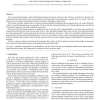Free Online Productivity Tools
i2Speak
i2Symbol
i2OCR
iTex2Img
iWeb2Print
iWeb2Shot
i2Type
iPdf2Split
iPdf2Merge
i2Bopomofo
i2Arabic
i2Style
i2Image
i2PDF
iLatex2Rtf
Sci2ools
139
click to vote
ALGOSENSORS
2010
Springer
2010
Springer
From Key Predistribution to Key Redistribution
One of crucial disadvantages of key predistribution schemes for ad hoc networks is that if devices A and B use a shared key K
to determine their session keys, then any adversarial device that holds K can impersonate A against B (or vice versa). Also, the
adversary can eavesdrop communication between A and B for the lifetime of the system.
We develop a dynamic scheme where a system provider periodically broadcasts random temporal keys (e.g. using GSM technology
or local broadcasting services) encrypted with keys from the main predistribution pool. Shared temporal keys (and not the
keys from the main pool) are used to establish session keys.
The trick is that the scheme broadcast is organized in such a way that with a high probability two devices share much more
temporal keys than the keys from the main pool of keys. Also, the shared temporal keys come not only from shared permanent
keys but predominantly from the permanent keys that are not shared by the devices. After each re-d...
Related Content
| Added | 12 Jan 2011 |
| Updated | 13 Mar 2011 |
| Type | Journal |
| Year | 2010 |
| Where | ALGOSENSORS |
| Authors | Jacek Cichon, Zbigniew Golebiewski, Miroslaw Kutylowski |
Comments (0)

